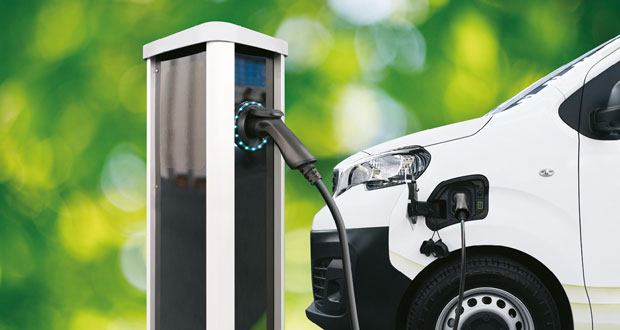 As the UK accelerates towards a greener future, the adoption of electric vehicles (EVs) is a crucial step towards achieving net zero. Graham Paul, Service Delivery Director at TEAM Energy explores some effective ways employers can support their staff in the uptake of EVs
As the UK accelerates towards a greener future, the adoption of electric vehicles (EVs) is a crucial step towards achieving net zero. Graham Paul, Service Delivery Director at TEAM Energy explores some effective ways employers can support their staff in the uptake of EVs
With transport accounting for 29 per cent of the UK’s greenhouse gas emissions in 2023, more than half of which came from cars and taxis the sector remains a critical focus in the nation’s commitment to achieve net zero carbon emissions by 2050. Electric vehicles (EVs), which produce zero emissions at the tailpipe, are central to this transition.
A GROWING MARKET WITH HUGE POTENTIAL
The UK’s EV market remains small but is gathering pace. As of June 2024, battery electric vehicles made up three per cent of the car fleet, with hybrids at eight per cent. Yet the real shift is in new sales, 19 per cent of all cars registered mid-2024 were fully electric, up from just one per cent in 2018. This growth signals rising consumer confidence and a timely opportunity for employers to get behind the transition.
Supporting employees in the shift to electric vehicles not only advances an organisation’s environmental sustainability goals but also strengthens its corporate social responsibility and enhances employee satisfaction.
THE LEGISLATION’S KEY PHASE-OUT DATES
The UK government has set a two-phase approach to end the sale of new petrol and diesel vehicles:
- By 2030: The sale of new petrol and diesel cars and vans will be banned.
- By 2035: All new cars and vans must be fully zero-emission at the tailpipe. This includes electric vehicles and hydrogen fuel cell vehicles.
- Hybrid Vehicles: Plug-in hybrids and other low-emission vehicles that can drive a significant distance with zero emissions will still be allowed until 2035. The government has clarified that fossil-fuel plug-in hybrids can be sold until 2035, offering manufacturers and consumers a more gradual transition.
WORKPLACE CHARGING AND TAX BENEFITS
One of the biggest barriers to EV adoption is the availability of charging points. The provision of free charging for electric vehicles at or near the workplace is exempt from Benefit in Kind (BiK) taxation. This means that employees can charge their EVs without incurring additional tax liabilities, and employers do not need to report this benefit to HMRC. This exemption applies to both company-owned and privately-owned electric vehicles and is a powerful incentive for employers and employees alike.
BENEFITS OF SUPPORTING EV ADOPTION
- Attracting and retaining talent: Offering free EV charging can be an attractive perk for current and potential employees, demonstrating your commitment to their wellbeing and the environment.
- Enhance corporate image: Supporting sustainable practices can enhance your organisation’s reputation and brand image, making it more appealing to clients, partners, and investors who value environmental responsibility.
- Contribute to environmental goals: By encouraging the use of electric vehicles, you are contributing to reducing carbon emissions and supporting the UK’s environmental goals.
PRACTICAL STEPS FOR EMPLOYERS
Supporting staff in the transition to electric vehicles isn’t just about ticking a sustainability box. It’s about creating a workplace that empowers informed, future-facing decisions. Here’s how organisations can take meaningful steps to ease the EV journey for their teams and lead by example in the shift toward a low-carbon future.
- Install charging infrastructure: By making EV charging accessible and visible at the workplace makes it convenient for employees to charge their vehicles during working hours. This helps to alleviate range anxiety and demonstrates the organisation’s commitment to sustainability.
- Offer financial incentives: Financial incentives can significantly encourage employees to switch to EVs. Employers can provide subsidies or interest-free loans for the purchase of EVs. Additionally, offering salary sacrifice schemes where employees can lease EVs through their employer can make the transition more affordable.
- Educate and raise awareness: Many employees may be hesitant to switch to EVs due to a lack of knowledge about their benefits and functionality. Employers can organise informational sessions, workshops, and webinars to educate staff about the advantages of EVs, such as lower running costs, reduced emissions, and government incentives.
TEAM’s EV Savings Calculator is designed to provide an estimate of the potential savings employees can enjoy by switching from traditional petrol or diesel vehicles to electric vehicles.
- Promote EV carpooling: Encouraging carpooling among employees who own EVs can maximise the use of these vehicles and reduce the overall carbon footprint. Employers can facilitate carpooling programs and provide incentives for employees who participate.
- Partner with EV providers: Forming partnerships with EV manufacturers or dealerships can provide employees with exclusive discounts and offers on EV purchases. This can make the transition to EVs more attractive and financially viable for staff.
- Recognise EV Champions: Celebrate employees who make the switch to inspire others to follow their lead. Whether it’s through shout-outs in company newsletters, small incentives, or dedicated “Green Champion” awards, recognising these employees creates a ripple effect that builds a culture of positive change.
WHY EVS ARE THE SMART CHOICE FOR COMPANY CAR OWNERS
One of the most significant advantages of EVs is their lower Benefit in Kind (BIK) rates. As of the 2024/25 tax year, the BIK rate for electric cars is set at just two per cent. This rate will gradually increase by one per cent each year, reaching five per cent by the 2027/28 tax year. In contrast, petrol and diesel vehicles typically have much higher BIK rates due to their higher CO2 emissions.
An employee driving a petrol or diesel company car with a BIK rate of 25 per cent would pay significantly more in taxes compared to an employee driving an EV with a BIK rate of two per cent. These savings can make a considerable difference in an employee’s take-home pay.
In addition to tax savings, EVs generally have lower running costs compared to petrol and diesel vehicles. Electricity is cheaper than petrol or diesel, and EVs have fewer moving parts, resulting in lower maintenance costs.
TEAM has supported a successful EV transition with a salary sacrifice scheme and the provision of 10 free charging points, giving their employees the opportunity to make sustainable choices. Supporting your staff in the uptake of electric vehicles is a win-win for both the environment and your business. By providing the necessary infrastructure, financial incentives, and educational resources, employers can play a crucial role in accelerating the transition to a greener future. Embrace the change and lead by example, showing your commitment to sustainability and innovation.





